26 February 2016
Here are the spellings for this week:
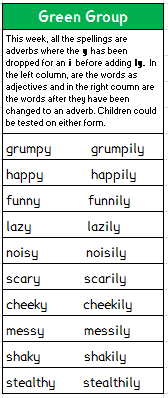
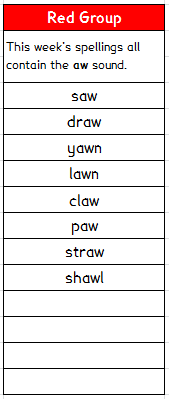
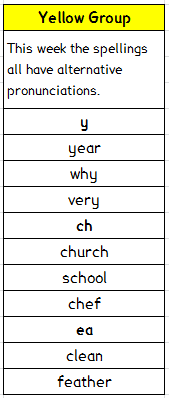
26 February 2016
This week’s spelling are a little different. I won’t be sending a list of spelling for the children to learn but a spelling rule to practise instead:
double up for a short vowel sound
At home, see if you and other members of your family can think of words that follow this rule and practise these. Remember the different ways we’ve used to practise spelling:
- pyramid spelling
- word shapes
- missing letters
There will be a test on Friday and all of the words tested will follow the double up rule.
26 February 2016
This week’s Creative homework is due on Wednesday 02 March.
To be able to work with money.
We don’t often get creative with Maths but that’s our challenge for this homework. Next week’s Maths will be all about money so think about how you can work with money for your homework. There are all sorts of things you could do for this:
- Take photos of you using money in real life.
- Create your own shop at home and be the till master.
- Create a quiz or challenge for others to try in class.
- Write word problems that require you to understand money.
- Think about all of the situations where you’re required to use money.
The more creative the better and I look forward to seeing what comes in as Year 5’s homework is always great fun to look at.
26 February 2016
This week’s Practice Makes Perfect homework is due on Wednesday 02 March.
To be able to learn a poem by heart.
We started learning ‘Daffodils’ by William Wordsworth in our English lesson this week. Most of us could recite the first verse by the end of the lesson. We challenged each other to see who could recite the most and Emre impressed us all by remembering all of the first two verses!
See how much you can learn at home and we’ll have another ‘poem-off’ on Wednesday.
A great week back
A big thank you to Year 5 who have all come back after the half term ready and raring to go.
In English, we’ve enjoyed performing, learning, reading and writing poetry this week. As it turns out, lots of us are natural performers or great a getting creative with the pen.
In Maths, we’ve explored decimals and we’ll continue this learning next week by focussing on money.
We all really enjoyed PE this week, particularly returning to our work with the Leeds Beckett students. Grace and Aleena were awarded with this week’s ‘Wow work’ for their great efforts marking each other during a game of basketball. Both of them were exhausted by the end of the lesson.
Next week, we’ve got World Book Day on Thursday where children are invited to come dressed as a character from a book and to bring in their favourite book from home.
Tchoukball returns to Year 6!
This half term, in PE, we will be learning all about Moortown’s favourite sport: tchoukball!
We spent our first lesson yesterday reminding ourselves of the game, its rules and the skills we need to play it. We arranged our thoughts using a spider-diagram as we moved through the lesson (sorry about the shadow!). You could ask your child: Are any of these skills transferable to other sports? Can you discuss each skill in more detail? Is one skill more important than the others? Which skills are you most confident with? Which skills do you feel you need to improve most?
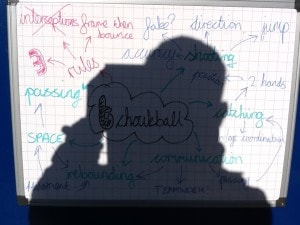
We had lots of fun playing this action-packed game again; here are some action shots:
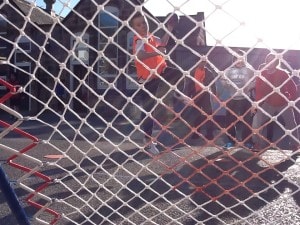
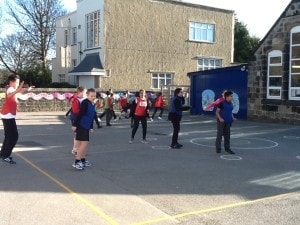
Please remember, children need their PE kit in school on Tuesdays and Fridays – this is their responsibility!
Well done to all
On Monday morning, we noticed a smell of gas from the cellar in school (this is located below the front building of the school).
We followed advice from Transco which was for all children and staff to leave the site. We did this straight away. We have plans in place for situations like this so we were well-prepared; set out in the plan is for people to walk to Highfield Primary.
In the event, Transco arrived really quickly – as a school, we are a priority – and, following checks, advised us that children could return. Children had only just arrived at Highfield.
Through all of this, staff remained calm and concerned, with children’s safety as a priority. In addition, children were well-behaved, as always – it helps that we carry out regular fire drills so they are well-prepared.
Transco has identified the problem and we are getting it fixed as a matter of priority.
World Book Day menu
World Book Day is celebrated on 03 March and during that week (Wednesday 02 March) we will be having a World Book Day Roald Dahl menu for school dinners.

Our next SEAL theme – Getting on
For this half term, our SEAL theme Getting On covers four main aspects:
- developing the social skills of friendship
- working well together in a group
- managing anger
- resolving conflict
A key resource for children to refer to during this theme, and at other times, is Peaceful Problem Solving. This is a useful resource to encourage children to sort out their own problems. You may wish to talk through this with your child(ren).
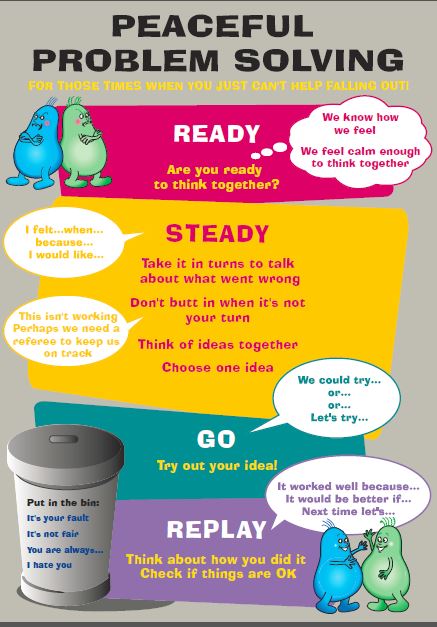
When group work takes place in school, some questions for children to consider are:
- Did everyone take turns?
- Did everyone listen to what other people thought?
- Did each person have chance to tell the group what they thought?
- If people had different ideas could the group reach a compromise?
The key areas of learning throughout this theme are empathy, managing feelings and social skills.
We start our weekly SEAL statements with a focus on manners, I don’t interrupt (with my mouth or with my hand).
Sainsbury’s Sport Relief Mile comes to Leeds
The Sainsbury’s Sport Relief Mile is back – and it’s coming to Leeds.
Yorkshire Sport Foundation will host a Sainsbury’s Sport Relief Mile on Sunday 20 March.
Setting off from Woodhouse Moor, the Yorkshire Sport Foundation Leeds Mile event offers a 1 mile, 3 mile or 6 mile route.

